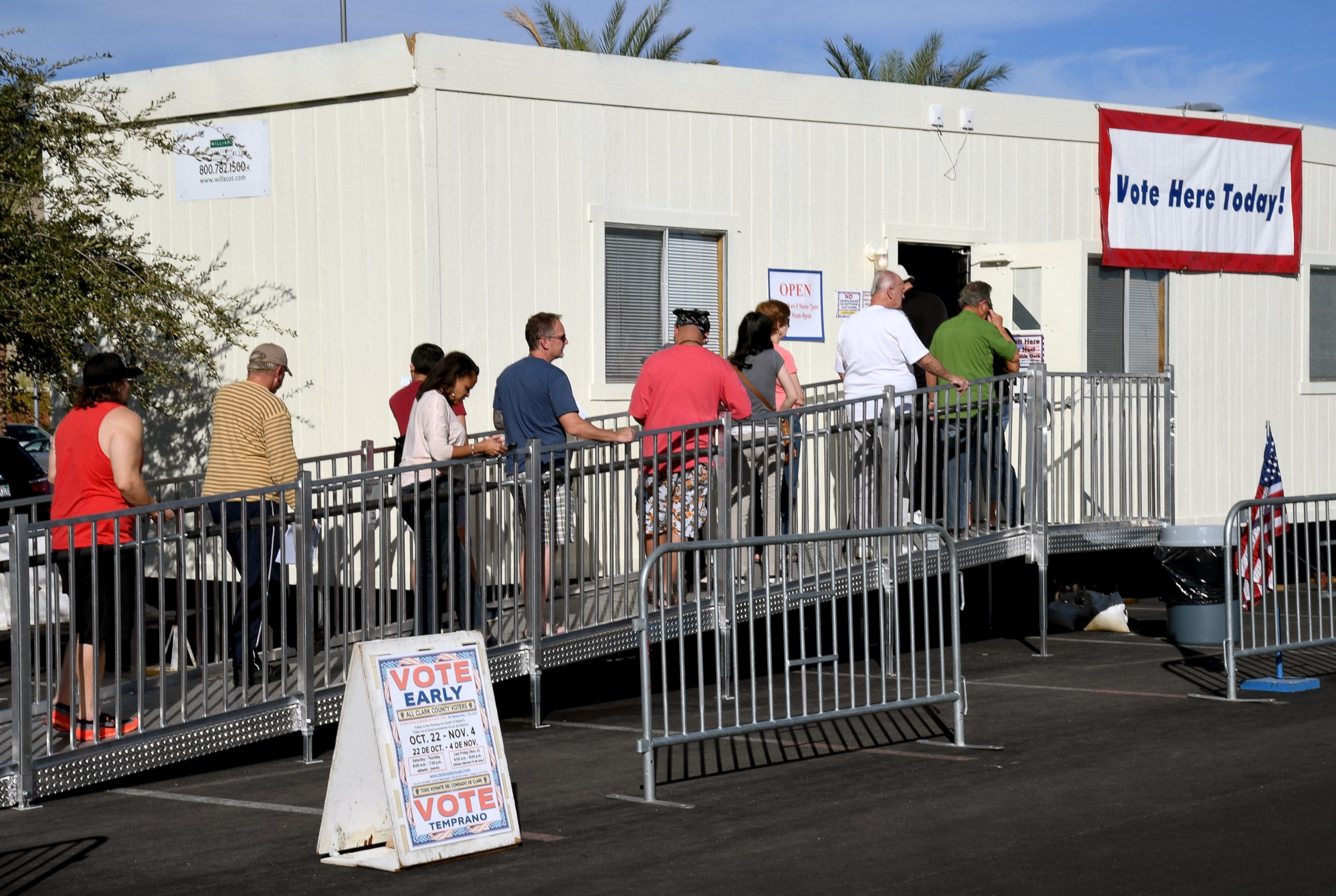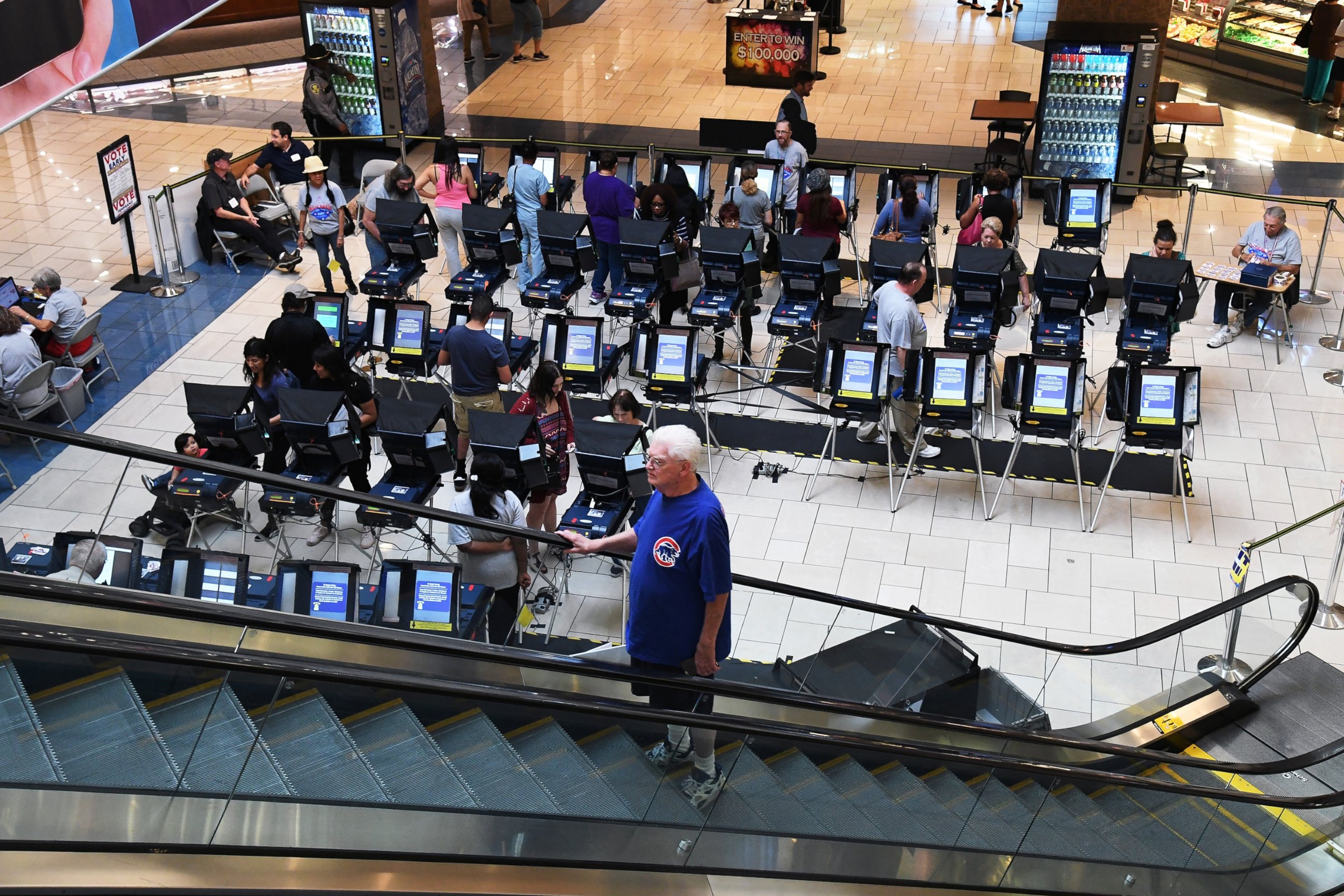Voter Complaints Up as Election Day Nears, Advocates Say
Some early voters are complaining about misinformation on voting rules.
— -- Some early voters in a community near Dallas complained to voting-rights advocates that an armed patrol person stood near them in line at their polling place, talking about political hot-button issues, leaving some feeling uncomfortable about casting their vote, a representative for a national organization active on voting-rights issues told ABC News.
The Denton County Sheriff's Office in Texas told ABC News that it was aware of the reports at the Carrollton polling station and that the armed person was not from its ranks.
"We heard it was happening, but it is not someone from our agency," said Sandi Brackeen, a public information officer for the sheriff's office.
Other voters in Texas have complained to advocates about polling sites allegedly posting incorrect information about identification requirements for people wanting to vote, advocacy groups said.
The reports in the Lone Star State are just a small part of what voting-rights advocates are calling a growing wave of complaints around the country from voters facing long lines and malfunctioning machines, receiving incorrect information on requirements to vote and, in some cases, feeling intimidated about casting a ballot.
"This election cycle, we are most certainly receiving more complaints," said Kristen Clarke, the president and executive director of the Lawyers' Committee for Civil Rights Under Law in Washington, D.C.

Voting-rights advocates see the rise in complaints as linked to this year's being the first presidential election since a 2013 Supreme Court decision that significantly weakened the Voting Rights Act, a landmark civil rights law passed in 1965. Justices eliminated a requirement in the federal law that some states and localities with a history of discrimination get approval before changing any rules or practices in their election system that could affect minorities.
"The loss of [that section of the Voting Rights Act] and the most racially bigoted presidential campaign in generations has created a perfect storm for voter intimidation and voter discrimination,” said Wade Henderson, the president and CEO of the Leadership Conference on Civil and Human Rights, a coalition of over 200 organizations based in Washington, D.C.
After the high court ruling, about a dozen states — including Texas, North Carolina and Alabama — set new policies on voting, including in many cases new requirements that people present photo identification before casting a ballot. A common reason given by states for the new policies was to prevent voter fraud.
Many states' new voting rules were met with lawsuits. In Texas a federal appeals court ruled in July that it is discriminatory to require voters to present a government-issued photo ID to be able to vote.
Texas voters in this election now may present other forms of identification.
But some early voters in several Texas counties reported seeing information posted at poll sites incorrectly suggesting that everyone must still have a photo ID to vote, according to an article on the Brennan Center for Justice's website.
With the shifting rules on voting, many people around the country are confused, even with the presidential election next week.
About 1 in 5 voters lives in a state requiring a photo ID to vote but doesn't know it, according to a Pew Research Center survey released last week. And the confusion goes both ways, the survey finds. About 4 in 10 voters in states with no identification requirement incorrectly believe they have to show ID in order to vote.

Election Protection, the nation's largest nonpartisan coalition for ensuring voter access to the polls, told ABC News that it and its partner organizations have so far fielded at least 48,000 calls and emails from around the country this election cycle, including complaints and questions about voting rules in particular states.
The complaints have largely been about long lines, malfunctioning machines, perceived voter intimidation and the distribution of inaccurate information about voting rules at early-voting sites around the country, said Clarke. The Lawyers' Committee for Civil Rights is spearheading Election Protection's efforts to safeguard voters' rights in this election with hotlines, field monitors and voter education.
At least 325 calls and emails have come from Texas since early voting began there last Monday, including the report on the armed patrol person at a polling site in Denton County, she said.
This week the Leadership Conference on Civil and Human Rights and dozens of other national civil rights and voting rights groups sent letters to state election officials in every U.S. state, urging them to develop plans to ensure no voters are disenfranchised on Nov. 8.
"Numerous states have passed voting laws, which several federal courts agree have a disparate impact on people of color and language minorities," states the letter, dated Oct. 24. "Evidence shows that restrictive voter laws also suppress turnout of the elderly, people with disabilities and students."
"State election officials must address these unprecedented threats head on by creating and publicizing clear plans to prevent intimidation and discrimination," Henderson said.




